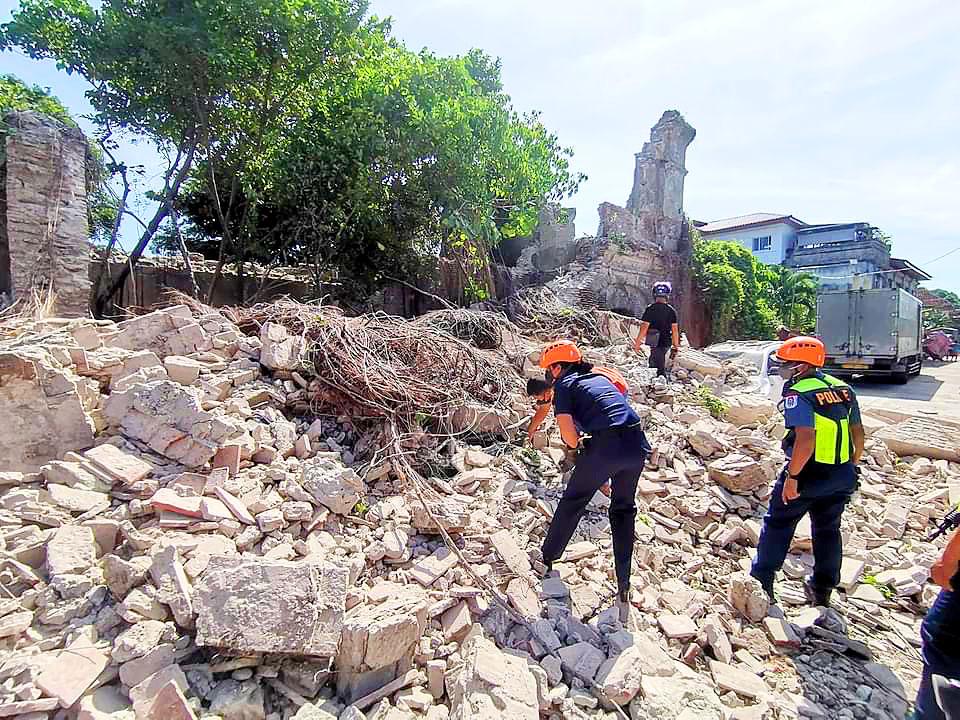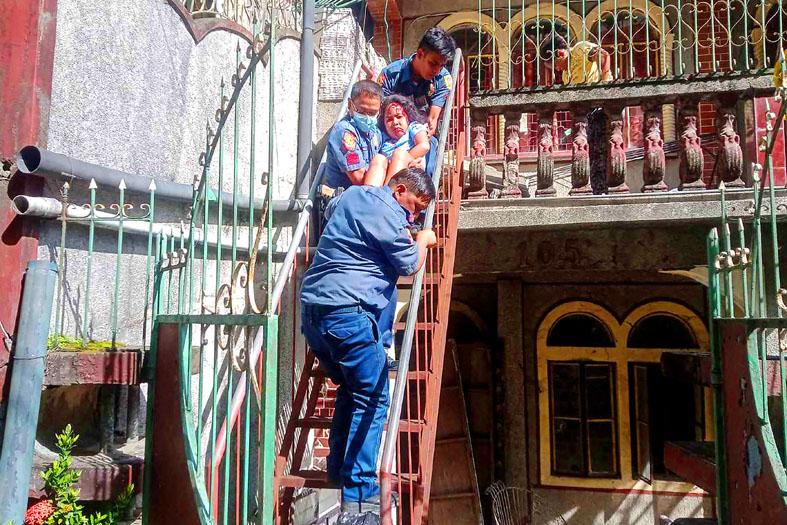A magnitude 7.0 earthquake yesterday killed at least five people in the northern Philippines, toppling buildings and shaking high-rise towers more than 300km away in the capital, Manila.
The shallow and powerful quake struck the mountainous and lightly populated province of Abra on the main island of Luzon at 8:43am, the US Geological Survey said.
Shallow earthquakes tend to cause more damage than deeper ones. This one left more than 100 people injured across the hilly region, triggered dozens of landslides, damaged buildings and knocked out power.

Photo: EPA-EFE
“We felt really strong shaking. We started shouting and rushed outside,” said university student Mira Zapata in the San Juan municipality of Abra, which took the full force of the quake.
“Our house is OK, but houses down the hill were damaged,” she said.
As buildings shook and walls cracked in the municipality of Dolores, people ran outside, police Major Edwin Sergio said.

Photo: AFP / Bangued Police
In Bangued, the provincial capital of Abra, a 23-year-old woman was killed after a wall fell on her, police said.
At least 78 were injured in the province.
A video posted on Facebook and verified by Agence France-Presse showed cracks in the asphalt road and ground in Bangued.
Two construction workers in the nearby landlocked province of Benguet died in separate incidents, police said.
Another person was killed when boulders smashed into the building site where he was working in Kalinga province, police said.
Six other workers were injured.
Police said an elderly woman in Suyo municipality in Ilocos Sur province suffered fatal injuries after she was buried by a landslide while out walking.
In Vigan City, a UNESCO World Heritage site in Ilocos Sur, centuries-old structures built during the Spanish colonial period were damaged, police said.
Yesterday’s quake was one of the strongest recorded in the Philippines in years and was felt across swathes of Luzon. It was followed by nearly 300 aftershocks, the local seismological agency said.
Residents and office workers in Manila were evacuated from high-rise buildings.
In Taipei, Minister of Foreign Affairs Joseph Wu (吳釗燮) asked Department of East Asian and Pacific Affairs Director-General Wallace Chow (周民淦) to convey his condolences to Manila Economic and Cultural Office (MECO) Deputy Representative Teodoro Luis Javelosa, Jr, and to say that the National Fire Agency was on standby to provide assistance if needed.
Representative to the Philippines Michael Hsu (徐佩勇) also reached out to Silvestre Bello III, the newly appointed MECO chairman and representative to Taiwan, to express condolences and offer assistance.
According to the information obtained by the Taipei Economic and Cultural Office (TECO) in the Philippines, Taiwanese living in the country were reportedly safe.
The ministry said that Taiwanese living in the Philippines needing assistance can call TECO at +63-917-819-4597, or ask relatives and friends in Taiwan to call the ministry’s Emergency Contact Center at 0800-085-095.

CALL FOR SUPPORT: President William Lai called on lawmakers across party lines to ensure the livelihood of Taiwanese and that national security is protected President William Lai (賴清德) yesterday called for bipartisan support for Taiwan’s investment in self-defense capabilities at the christening and launch of two coast guard vessels at CSBC Corp, Taiwan’s (台灣國際造船) shipyard in Kaohsiung. The Taipei (台北) is the fourth and final ship of the Chiayi-class offshore patrol vessels, and the Siraya (西拉雅) is the Coast Guard Administration’s (CGA) first-ever ocean patrol vessel, the government said. The Taipei is the fourth and final ship of the Chiayi-class offshore patrol vessels with a displacement of about 4,000 tonnes, Lai said. This ship class was ordered as a result of former president Tsai Ing-wen’s (蔡英文) 2018

UKRAINE, NVIDIA: The US leader said the subject of Russia’s war had come up ‘very strongly,’ while Jenson Huang was hoping that the conversation was good Chinese President Xi Jinping (習近平) and US President Donald Trump had differing takes following their meeting in Busan, South Korea, yesterday. Xi said that the two sides should complete follow-up work as soon as possible to deliver tangible results that would provide “peace of mind” to China, the US and the rest of the world, while Trump hailed the “great success” of the talks. The two discussed trade, including a deal to reduce tariffs slapped on China for its role in the fentanyl trade, as well as cooperation in ending the war in Ukraine, among other issues, but they did not mention

Japanese Prime Minister Sanae Takaichi yesterday lavished US President Donald Trump with praise and vows of a “golden age” of ties on his visit to Tokyo, before inking a deal with Washington aimed at securing critical minerals. Takaichi — Japan’s first female prime minister — pulled out all the stops for Trump in her opening test on the international stage and even announced that she would nominate him for a Nobel Peace Prize, the White House said. Trump has become increasingly focused on the Nobel since his return to power in January and claims to have ended several conflicts around the world,

GLOBAL PROJECT: Underseas cables ‘are the nervous system of democratic connectivity,’ which is under stress, Member of the European Parliament Rihards Kols said The government yesterday launched an initiative to promote global cooperation on improved security of undersea cables, following reported disruptions of such cables near Taiwan and around the world. The Management Initiative on International Undersea Cables aims to “bring together stakeholders, align standards, promote best practices and turn shared concerns into beneficial cooperation,” Minister of Foreign Affairs Lin Chia-lung (林佳龍) said at a seminar in Taipei. The project would be known as “RISK,” an acronym for risk mitigation, information sharing, systemic reform and knowledge building, he said at the seminar, titled “Taiwan-Europe Subsea Cable Security Cooperation Forum.” Taiwan sits at a vital junction on